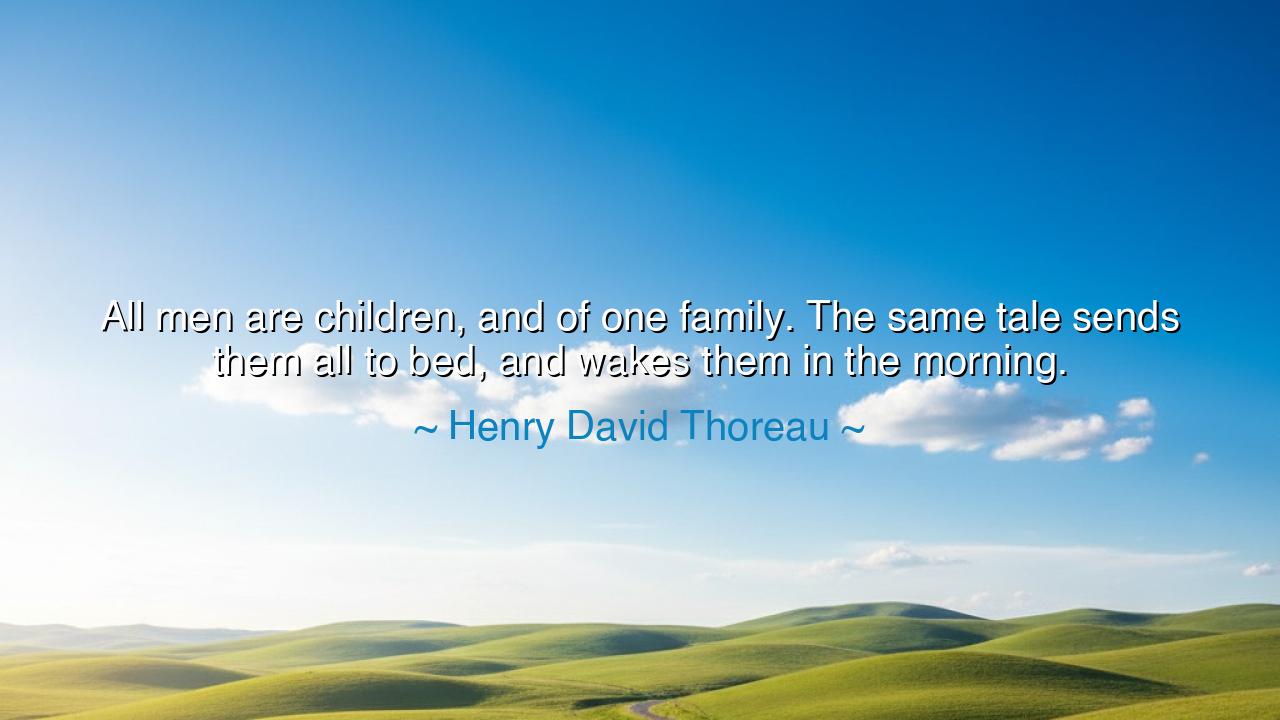
All men are children, and of one family. The same tale sends
All men are children, and of one family. The same tale sends them all to bed, and wakes them in the morning.






When Henry David Thoreau declared, “All men are children, and of one family. The same tale sends them all to bed, and wakes them in the morning,” he did not speak as one concerned with trivialities, but as a prophet unveiling the hidden unity of humankind. In these few words, he compresses the vast expanse of human experience into a single, tender image: that no matter our station, our wealth, or our learning, we remain children, yearning for guidance, comfort, and stories that give shape to our lives. His voice echoes across the ages, reminding us that the divisions we create are illusions, for beneath them we are bound together by the same desires, the same fears, and the same hopes.
The heart of this saying lies in the image of the tale. A story—whether whispered by a mother at a hearth, sung by a bard in a hall, or read by a weary worker at night—has the power to unite all. The same tale that lulls a child to sleep also soothes the king. The same tale that calms the heart at night also stirs it at dawn. In speaking thus, Thoreau reveals the primal truth that narrative, myth, and shared meaning are the cords that bind humanity as one family. For in story we find both rest and awakening, both shelter and strength.
The ancients themselves bore witness to this. Did not the Greeks gather to hear the recitations of Homer, whose words united warriors, farmers, and rulers alike? The Iliad and the Odyssey were not mere entertainments, but tales that sent a people to rest in remembrance of their heroes, and roused them in the morning to courage and action. Likewise, in every civilization, from the Vedas of India to the sagas of the North, the tale has been the common thread by which all men—child and elder, rich and poor—knew themselves as one people.
History also gives us the vision of Abraham Lincoln, who during the Civil War turned to stories as a balm and a guide. In times of crisis, he would gather his advisers and recount parables or humorous tales, not in frivolity, but in wisdom. Those stories soothed the weary, calmed the anxious, and often carried truths too deep to be spoken outright. In this, Lincoln lived what Thoreau proclaimed: that the tale is the shared inheritance of humanity, capable of putting men to bed in peace and waking them with renewed strength for the day’s labor.
In calling men children, Thoreau does not belittle, but ennobles. He reminds us that the child’s wonder, openness, and need for guidance remain in us always. To see ourselves as children is to embrace humility, to admit that we are never so wise, so strong, or so complete that we do not still hunger for meaning, for story, for belonging. The tale weaves us into a great household—the household of mankind—where all sit together as siblings, learning and dreaming side by side.
The lesson, then, is clear: remember the unity of humanity, and honor the stories that bind us. Do not despise the tales of the past, nor think yourself above the need for them. Read them, tell them, pass them on. Recognize that even the stranger across the world, so different in tongue or dress, is still your kin, moved by the same longings, comforted by the same rhythms of story and life. When you remember this, compassion grows, and pride diminishes, for you see that you belong to the great family of man.
Practically, let us take up the discipline of storytelling in our own lives. Share with your children, your friends, your community the tales that give hope, that teach courage, that knit souls together. Receive the stories of others with reverence, for in them lies the heartbeat of our shared humanity. In doing this, we awaken not only ourselves but the generations to come.
Thus Thoreau’s words, gentle yet profound, remind us that beneath all divisions we remain as children, guided by the power of the tale, and joined as one family. Let us live with this truth in our hearts, rising each morning not as isolated beings, but as brothers and sisters bound together in the eternal story of humankind.






AAdministratorAdministrator
Welcome, honored guests. Please leave a comment, we will respond soon